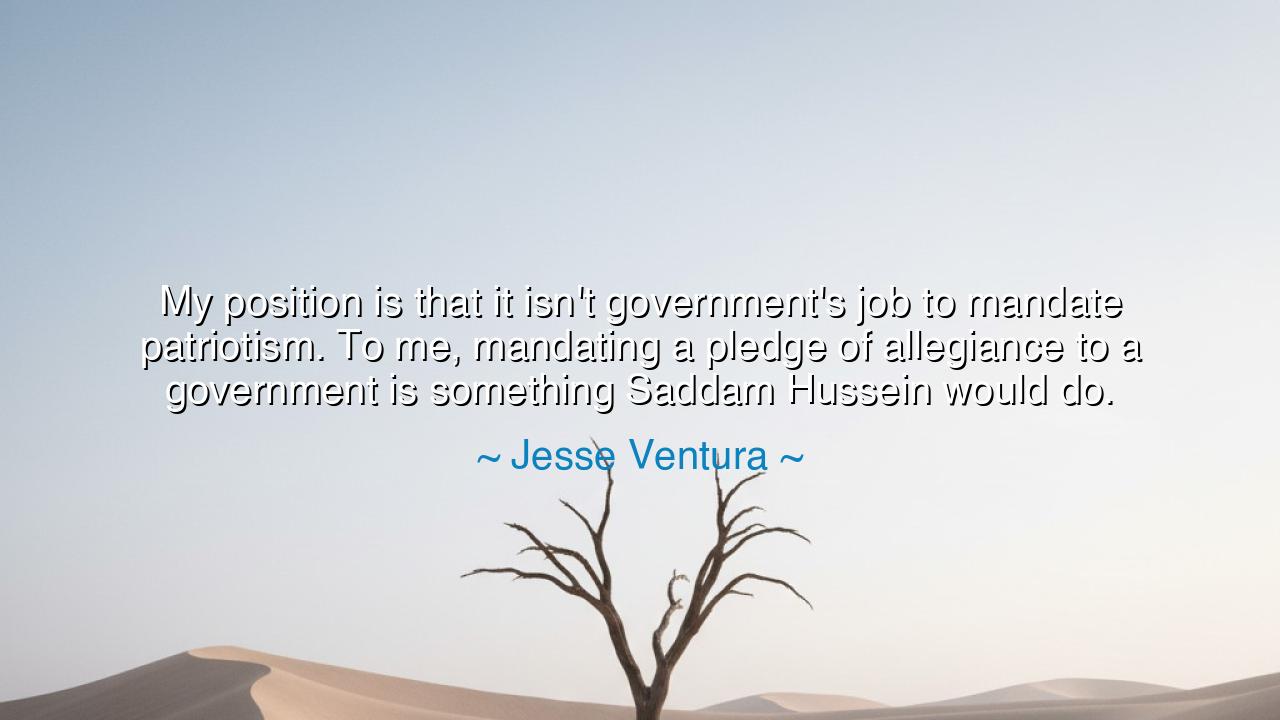
My position is that it isn't government's job to mandate
My position is that it isn't government's job to mandate patriotism. To me, mandating a pledge of allegiance to a government is something Saddam Hussein would do.






The statesman and warrior Jesse Ventura once declared with unflinching clarity: “My position is that it isn't government's job to mandate patriotism. To me, mandating a pledge of allegiance to a government is something Saddam Hussein would do.” In these words lies a powerful meditation on the nature of patriotism and freedom. True devotion to one’s country is not compelled through coercion, ritual, or law; it is a flame that must arise naturally in the hearts of citizens. To mandate loyalty is to corrupt it, replacing love and conviction with fear and obligation.
In the wisdom of the ancients, loyalty and devotion were prized not when commanded, but when freely offered. Plato wrote that virtue cannot be imposed; it must be cultivated in the soul. Ventura echoes this timeless teaching, warning that patriotism, like justice, courage, and honor, cannot be manufactured by edict. Forced allegiance may yield outward compliance, but the spirit remains unyielding or hollow. True love of country, therefore, is not the product of decree—it is born of reflection, experience, and moral conviction.
History provides stark examples of both mandated loyalty and the cost of its enforcement. Consider the totalitarian regimes of the 20th century, from Nazi Germany to Saddam Hussein’s Iraq. Citizens were compelled to salute, pledge, and declare loyalty to the state and its leaders. Yet these outward displays of patriotism often concealed fear, resentment, and moral compromise. Ventura’s warning echoes through history: when a government seeks to enforce devotion, it diminishes both liberty and genuine allegiance, and it risks corrupting the very ideals it claims to defend.
By contrast, consider the example of the American Revolution. The patriots who risked life and liberty did so from conviction, not compulsion. They pledged allegiance to ideals of liberty, justice, and self-determination freely, in defiance of a distant crown. Their patriotism was authentic because it was chosen, not coerced. Ventura’s words remind us that true allegiance, whether to principles or to nation, flourishes only when freely embraced. It is moral courage, not mandated repetition, that secures loyalty worthy of honor.
The meaning of Ventura’s reflection is both moral and civic. Patriotism imposed by law is hollow; it becomes an instrument of power rather than a virtue. Love of country, to be noble, must arise from understanding, appreciation, and ethical commitment. Mandated rituals, pledges, or oaths cannot create this devotion; they may only simulate it, producing outward conformity while leaving the soul untouched. Ventura contrasts genuine allegiance with authoritarian compulsion to underscore the distinction between freedom and tyranny.
Consider the story of Martin Luther King Jr. and the Civil Rights Movement. King urged citizens to act according to conscience and justice, not merely to obey laws or perform rituals. True allegiance to the nation’s ideals required critique, dissent, and moral courage. Those who blindly conformed without reflection, in contrast, upheld unjust systems. Ventura’s insight aligns with this lesson: real patriotism is active, critical, and voluntary—it is never the product of coercion or fear.
The lesson for generations is unmistakable: one cannot mandate devotion, and attempts to do so often degrade both patriotism and liberty. True allegiance is cultivated through education, example, and moral reflection. It thrives in societies where citizens understand the principles, history, and values of their nation, and where they are free to commit their hearts and actions accordingly. Patriotism that is chosen is noble; patriotism that is commanded is hollow, and often dangerous.
Practically, this calls citizens to foster informed, voluntary patriotism. Teach the ideals, history, and responsibilities of citizenship. Encourage reflection, debate, and engagement, rather than coercion or rote ritual. Support a society in which devotion arises from conviction, not decree. In doing so, one embodies Ventura’s wisdom: love of country is a matter of the heart and conscience, not the law, and genuine patriotism flourishes only in freedom.






AAdministratorAdministrator
Welcome, honored guests. Please leave a comment, we will respond soon